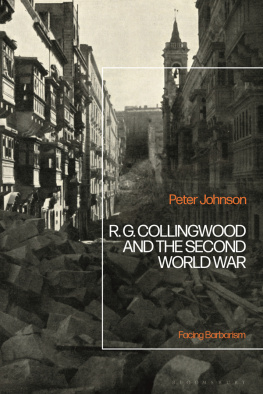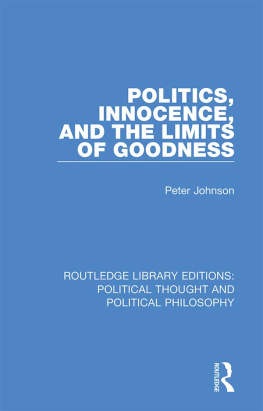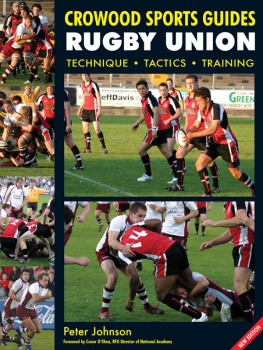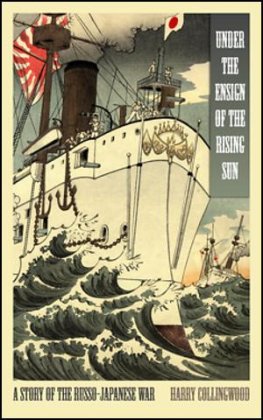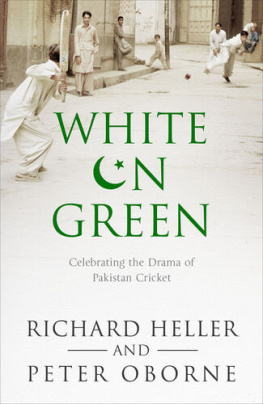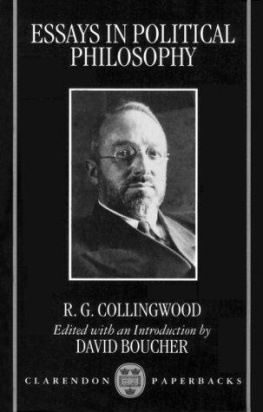R. G. Collingwood and the Second World War
R. G. Collingwoods The New Leviathan is a remarkable book. There has been nothing quite like it in philosophy before or since. Like all books it speaks for the author, but unlike many books it also speaks directly to us. The reason for this comes from its authors cast of mind as much as his way of doing philosophy. Collingwoods subject is the modern state, society, civilization and barbarism. But this is only half the story. None of these forbidding ideas would mean anything very much apart from the humanity that formulated them. Collingwood puts us humanity first. To understand our politics, our culture, our ways of life, we must understand the sensations, feelings, emotions, will and thoughts which feed them. The state is the product of the ways we feel and think. Civilization is expressed in its artefacts but it belongs primarily to the minds which bring them alive.
In Friths great painting The Derby Day the day belongs to the crowd. Horses and jockeys, even the race itself, are background to an occasion which is made by all. In the same way Collingwood puts humanity centre stage. What counts is that which makes a civilized existence possible and that is to be found in us. Equally, and it is a thought which some have wanted to resist, what defies civilization is found there, too. Collingwoods interest is not in us as a collection of individuals. His concern is not with mine or yours, as if these were always mutually exclusive. While he is often tempted to use the imperious we his overriding concern is with ours, with what hopes, fears and anxieties we share in a world in which we all happen to have been born and learn to speak, and in the location where history and the accidents of social circumstance have placed us. Like its great predecessor, the Leviathan of Thomas Hobbes, Collingwoods book has a universal voice as well as a particular one. It talks therefore to all societies which find their basic moral and political principles under attack and who are made to call on resources which are deeper than social and legal rules and institutions.
The New Leviathan owes a large debt to Hobbes and to the quite different tradition of philosophical idealism which forms the background to much of Collingwoods thinking. It also owes a great deal to history in the shape of the situation in which he and his country found themselves in 1939. In this way , 3). Frances fate might well have been Britains, too. Collingwood knew that to counter this feeling in thought he would have to dig deep into philosophy and history as well as the anxieties that the British people were experiencing. Topics which informed the book were those which worried people at the time: whether Hitler could be appeased, whether a future civilized life would be possible at all, who Britain was at war with the German people or Nazism, and justice in British society for those who had borne the burdens of war. These were the issues which poured in on Collingwood as writing progressed. These were the years through which Collingwood lived day by day, week by week, interrupted at times by prolonged illness years in which he articulated his thoughts about the times in philosophical terms. This approach widens his books scope and also reflects Collingwoods determination that the intellectual battle against barbarism has to be joined and that philosophy must be at the heart of it.
Few studies have addressed The New Leviathan from an historical point of view as well as a philosophical one. My aim is to make good this deficiency by showing how Collingwood changes his focus, as the book proceeds, from the defence of civilization to the unenviable actions of a liberal state when forced to set aside its principles to preserve its existence and to the role of civilization and its offspring, civility, in the reconstruction of a liberal society. The argument of The New Leviathan is intended to reach beyond its particular time, but history in the shape of the vicissitudes of life, in this case the twists and turns of a war against a vicious barbarism, together with the uncertainties of its outcome when Collingwood was writing the book during much of 1940 and 1941, is ever present.
Collingwoods hope was to make it clear to his readers just why Britain was fighting a war which was proving hugely costly in both human life and resources. Here was an opportunity to forge the rapprochements between philosophy and history and theory and practice which were his lifelong concerns. It was he who showed us how history, together with the distinctive work of the historian, should be understood and why history mattered to philosophers who, in his opinion, generally carried on their activities in stern disregard of it. The New Leviathan was the book Collingwood gave up his work on the philosophy of history to write. When we realize the importance of that subject to him we see just how demanding he must have found the choice which forced him to change tack. Moreover, when we appreciate the seriousness of the illness which all but overwhelmed him during the writing of the book we see also the degree of personal courage which he needed to find to bring the project to completion.
It can reasonably be said that Collingwood died before his time. Since Collingwoods death at least three generations of readers have ensured that most of his books have remained permanently in print. References to him and his work across the academic spectrum have never been more numerous and pretty much all his oeuvre is now available to be read, something which was not true in the years immediately following his death and for some time afterwards. Subjects of philosophical discussion such as aesthetics and the philosophy of history in each of which Collingwood published ground-changing work were very much in cold storage during Collingwoods lifetime and during subsequent years have been given the lease of life they deserved.
Collingwoods was a voice in the history of philosophy that was stilled too early. Importantly, what Collingwood left uncompleted was the manuscript of the work he gave up to write The New Leviathan . That work was The Principles of History , an undertaking that can reasonably be called his magnum opus, left unfinished at his death but now published in its original state (along with other pieces which for many different reasons were unpublished in Collingwoods lifetime). Such is his sympathy, breadth of interest and the inclusiveness of his understanding of civilization that new generations should have little difficulty in adapting his thoughts to their world. Had he lived Collingwood, never short of pugnacity when he thought it was needed, would certainly have wanted to say more about central themes to do with the ways of life of human beings in the late twentieth century and early twenty-first century. Governments generally dislike being told what to do and in the main Collingwood as a philosopher refrained from telling them, although there are passages in The New Leviathan where readers might easily be forgiven for thinking that is precisely what he is doing. Collingwoods official view was that the divide between philosophy and politics was conceptual. And it is this which ensures the permanent value of Collingwoods basic arguments. The New Leviathan is not a blank cheque in which future readers fill in the amount which takes their fancy, but Collingwood does readily admit that the pattern of ideas he expounds will never be totally exhaustive of alternative possibilities. History is not like that. When a liberal state faces a crisis from within or without, especially one where it is required to undermine or weaken its own principles in order to survive, then in these circumstances individuals are thrown back on their own moral resources to decide what to do. This is exactly how the first readers of Collingwoods book reacted: as happened in quite a few instances they covered their copies with annotations and comments, even on one occasion supplying their own index (for the first edition of the book, reprinted in 1944, and for many later impressions, there was none).


